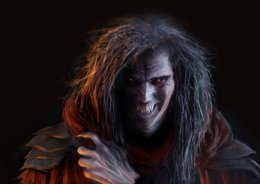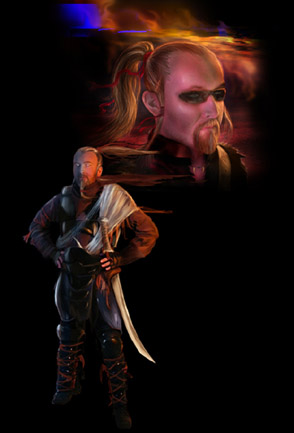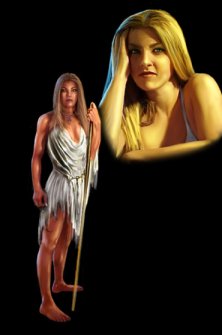|
The Villikon
Chronicles
It's
hard to know where to start with The Villikon Chronicles.
An original story by Bryan J. Kinnaird, converted from his
award-winning screenplay into graphic novel format by Roy
Young, the three volume saga is sub-amateur writing dressed
up with pretty pictures and sexy vampire vixens.
Chronicles
is set in a fundamentalist, military, space-faring universe,
populated by humans and some underdeveloped species of aliens.
Kort Villikon is our hero, a highly ranked warrior nobleman
framed for planetary genocide by his second in command, and
exiled to the penal planet of Arakkis, err Rura Penthe, no…wait,
here it is, Itasca. Yeah, that's it. Itasca is a desert wasteland
inexplicably topped with vast icecaps, and is home to exiled
prisoners, huge subterranean critters called dirt whales,
and a race of infectious mutants known as Porphyrians.
 The
Porphyrians it seems are a failed experiment in bio-warfare
created by a mad Admiral whose sole purpose in life seems
to be orbiting Itasca and concealing their existence. They
are lead by Creighton, a Rob Zombie look-alike with piranha
teeth, who sends them off to feed upon and infect the convicts.
The Porphyrians are vampire-like creatures whose bite will
cause the victim to become like them, powerful, evil and undead…with
a propensity for black armor or lingerie, depending on gender. The
Porphyrians it seems are a failed experiment in bio-warfare
created by a mad Admiral whose sole purpose in life seems
to be orbiting Itasca and concealing their existence. They
are lead by Creighton, a Rob Zombie look-alike with piranha
teeth, who sends them off to feed upon and infect the convicts.
The Porphyrians are vampire-like creatures whose bite will
cause the victim to become like them, powerful, evil and undead…with
a propensity for black armor or lingerie, depending on gender.
However,
the universe of The Villikon Chronicles is vast and
richly imagined. Though much of it is clearly inspired by
Frank Herbert's Dune series (the desert planet and
dirt whales, as well as the deeply religious nature of the
ruling class all invoke Dune), there is still enough
differentiation to set it apart. There is a great deal of
history suggested, which I'm sure will be covered in future
books.
What I
enjoyed most about the trilogy was the art. Credited for visual
design and conceptual art, Roy Young did a stunning job of
creating Villikon's world. Epic battles between dirt whales,
their larger cousins the war slugs, and really creepy fighter
jet sized mosquitoes called blood flies are realized in amazing
detail. The landscape of Itasca, particularly a hidden oasis
of green forests and flowers, are beautifully rendered with
a finely tuned sense of light and shadow.
The books
launch us into the universe with little explanation of the
society and characters, leaving it to the events and dialog
to do the job, and this is where it all falls apart. The text
is awful. I mean it's really, really bad. The action is narrated,
and even when it is clearly being shown, the narration explains
in overly flowery language what we're looking at.
In a scene
where Villikon has discovered the hidden oasis after years
of roaming through a desert, the narration, over scenes of
him stripping off his clothes and leaping from a waterfall
into a dark pool, tells us that he's stripping off his clothes
and leaping into a dark pool.
 Okay,
what it actually says is, Villikon: "I couldn't peel
away my dusty garments fast enough" then narration, "Villikon
leapt from the sure-footed safety of the plateau, and plunged
into the tropical waters of the unknown. Euphoric feelings
captured his better sense of judgment. A fatigued man doesn't
think about the consequence of entering dark waters." Okay,
what it actually says is, Villikon: "I couldn't peel
away my dusty garments fast enough" then narration, "Villikon
leapt from the sure-footed safety of the plateau, and plunged
into the tropical waters of the unknown. Euphoric feelings
captured his better sense of judgment. A fatigued man doesn't
think about the consequence of entering dark waters."
It goes
on to hint at something dark and dangerous lurking in the
deep, while Villikon swims through clear empty water. The
narration attempts to set up what a change in tone and lighting
could have accomplished, and instead of suspense, we get clumsy
description.
The dialog
is equally bad. I couldn't keep track of all the lines that
made me giggle at their absurdity, so I started tagging them
with post-it flags. I've gone through about thirty flags,
and that's only because I marked the page rather than the
line. During Villikon's exodus alone through the desert, his
voice-over narration tells us, "I walked the dunes alone
for what seemed like an eternity, never seeing a living thing.
It was a desert as empty and lifeless as my soul."
In another
scene, Villikon confronts a lone Porphyrian in the desert
and they have an almost friendly exchange of threats. The
Porphyrian, with the oh-so-subtle name of Luciphus, tells
Villikon how to kill him. Villikon asks him if they are going
to fight, and Luciphus declares, "This body shall only
cease with the cleaving of my head."
There
have to be better ways of telling the reader the Porphyrian's
weakness than having one of them explain it to a guy with
a sword.
There
are other offenses, Villikon refers to a pretty flower as
a, "floral species of anomalous beauty," but I won't
attempt to list them all. It's enough to say that it reads
like fan-fic written by a goth-wannabe adolescent just discovering
the glories of the thesaurus.
My other
complaints rest with the characterizations. Although the photoshopped
images of real people fitted in seamlessly with the fantastical
backgrounds, they had almost no expression, and there was
no sense of movement about them.
 The
male characters fared somewhat better in this respect, though.
The females were all fairly empty. Scantily clad and vacant,
every woman was defined solely by her relationship to men.
The one warrior woman on Itasca, when she was permitted to
bring out her two swords and look bad-ass, used her battle
skills to carve up a dead war slug for dinner. The
male characters fared somewhat better in this respect, though.
The females were all fairly empty. Scantily clad and vacant,
every woman was defined solely by her relationship to men.
The one warrior woman on Itasca, when she was permitted to
bring out her two swords and look bad-ass, used her battle
skills to carve up a dead war slug for dinner.
Women
in The Villikon Chronicles are judged based on their
sexual behavior. Do they remain true to their husband or lover?
Then they're good. Are they adulteresses or whores? Then they're
evil. It's interesting to note that before his banishment,
Villikon had carried out an affair with a crewmember of his
ship, yet when his wife marries his betrayor after his exile,
she becomes deserving of abandonment on Itasca.
Still,
it's male-oriented fantasy, which means boobs and hot girl-on-girl
action (hey, female vampires are alluring -- editor),
so I can't expect too much.
There're
plenty of boobs, explosions, really pretty art, and an interesting
mythology, so if you can get past the wretched dialog and
ham-handed exposition, you just may enjoy The Villikon
Chronicles.
|

 The
Porphyrians it seems are a failed experiment in bio-warfare
created by a mad Admiral whose sole purpose in life seems
to be orbiting Itasca and concealing their existence. They
are lead by Creighton, a Rob Zombie look-alike with piranha
teeth, who sends them off to feed upon and infect the convicts.
The Porphyrians are vampire-like creatures whose bite will
cause the victim to become like them, powerful, evil and undead…with
a propensity for black armor or lingerie, depending on gender.
The
Porphyrians it seems are a failed experiment in bio-warfare
created by a mad Admiral whose sole purpose in life seems
to be orbiting Itasca and concealing their existence. They
are lead by Creighton, a Rob Zombie look-alike with piranha
teeth, who sends them off to feed upon and infect the convicts.
The Porphyrians are vampire-like creatures whose bite will
cause the victim to become like them, powerful, evil and undead…with
a propensity for black armor or lingerie, depending on gender.
 Okay,
what it actually says is, Villikon: "I couldn't peel
away my dusty garments fast enough" then narration, "Villikon
leapt from the sure-footed safety of the plateau, and plunged
into the tropical waters of the unknown. Euphoric feelings
captured his better sense of judgment. A fatigued man doesn't
think about the consequence of entering dark waters."
Okay,
what it actually says is, Villikon: "I couldn't peel
away my dusty garments fast enough" then narration, "Villikon
leapt from the sure-footed safety of the plateau, and plunged
into the tropical waters of the unknown. Euphoric feelings
captured his better sense of judgment. A fatigued man doesn't
think about the consequence of entering dark waters."
 The
male characters fared somewhat better in this respect, though.
The females were all fairly empty. Scantily clad and vacant,
every woman was defined solely by her relationship to men.
The one warrior woman on Itasca, when she was permitted to
bring out her two swords and look bad-ass, used her battle
skills to carve up a dead war slug for dinner.
The
male characters fared somewhat better in this respect, though.
The females were all fairly empty. Scantily clad and vacant,
every woman was defined solely by her relationship to men.
The one warrior woman on Itasca, when she was permitted to
bring out her two swords and look bad-ass, used her battle
skills to carve up a dead war slug for dinner.





